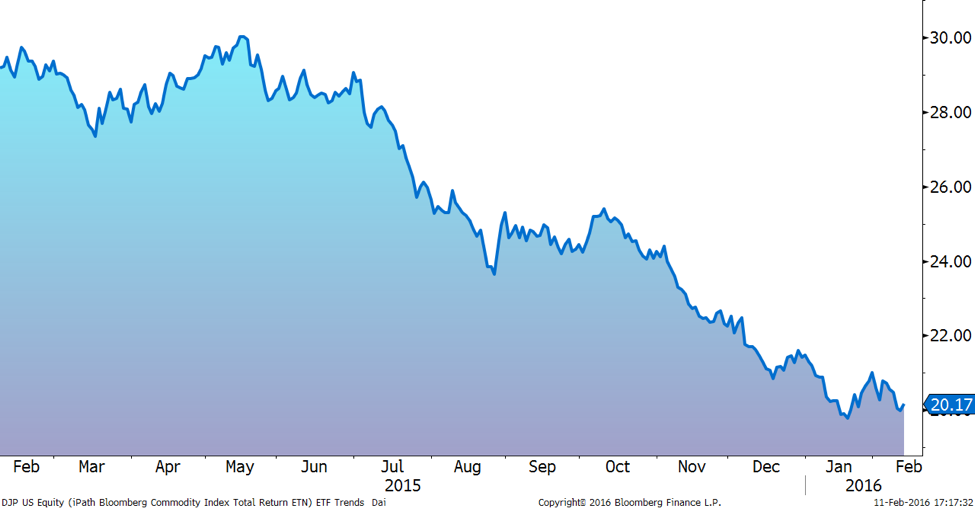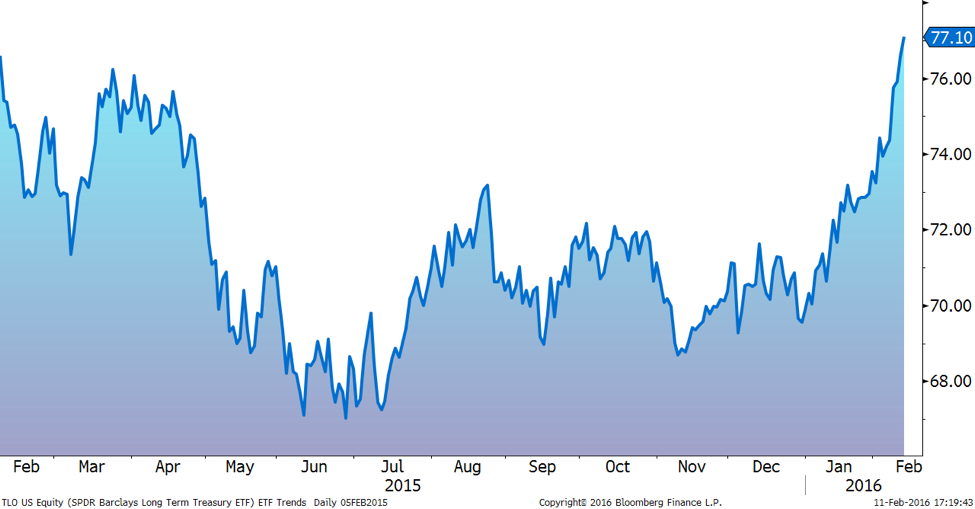Risk assets have had a rough run in 2016, and there are many cross currents adding to the confusion regarding what has been driving the unprecedented volatility. Our distilled view of what is occurring is simple: An aged and overvalued bull market has finally hit the wall of a poor technical environment.
But digging a bit deeper into the message of the markets, we find a common theme driving risk assets down in 2016—that theme is the sucking sound of deflation that is sapping pricing power across the globe. There are many areas that one can point to that reflect deflationary dynamics, but a few simple ETF charts reveal the big picture.
China (GXC-Chinese Equities)
One look at Chinese equity ETFs warns that ‘all is not well’ in the region. China is the number two economy in world, and their economic engine is decelerating fast as they try to work off a secular overreliance on investment at the same time that they are faced with a cyclical slowdown in the economy. As the economy has ground down and the stock market bubble has busted, China is now unleashing the sucking sound of deflation across the globe.
A Commodity Bear Market
A strong dollar is disinflationary, and it has mixed with the supply shock in commodity markets to create a vicious bear market in the overall commodity complex. Lower commodities and generalized inflation can be good for consumers, but the disinflationary global impulse that they reflect has also been weighing on pricing power for companies around the globe. Even strong U.S. multinational companies are caught in a vulnerable phase for earnings. Oil and mining companies are in the middle of a profits depression, and many companies in these industries are now adding default risk to the equation, which amplifies the deflationary impact across the globe.
Commodities/US Dollar (DJP-Commodities Futures)
Quality Bonds Benefit from Deflation
While stock earnings are decelerating based on poor pricing power and anemic global growth, quality bonds have been a primary beneficiary of the deflationary undertone running through the global economy. We realize that absolute levels of bond yields are very low historically, making bonds look like a poor investment on the surface. But digging a bit deeper, investors are forced to recognize that we live in a world where negative rates and unusual monetary policy prescriptions have been desperately trying to stir inflation expectations and future demand for years since the great credit crunch of 2008. And despite an incredible amount of money being thrown at the system, so far the great monetary experiments have not worked to thwart the deflationary impulses in the global economy.
Government Bonds (TLO-US Government Bonds)
What Happens Next?
The current wave of deflation appears to be striking a nerve with central banks, and both the ECB and BOJ are either jawboning or implementing more experimental policies to try to reflate their economies (see Japanese negative interest rate policy – NIRP). In the U.S., the Fed seems likely to downgrade its assessment of economic conditions in the near future to support growth, but for the moment it continues to be trapped by lagging economic data and the psychology of having to abort a tightening campaign that has barely lifted off the ground. Lastly, the PBOC is caught in the unenviable position of trying to stop the downside momentum that is building in their manufacturing sector, while also trying to keep their currency somewhat stable in the process.
The fact is, deflation is a problem and currently the world’s central banks are out of sync. At some point in the near future, the markets may force bankers into a position that might unite them again in a war against the deflationary tendencies weighing on the global economy and markets. Should that occur, investors need to be on guard that the trends in progress for some time could possibly reverse later this year and give way to a new inflation trade.
For now, we think it’s too early to play for a turnaround just yet, and we continue to position in a defensive manner and let the deflationary bear market runs its course.
Rick Vollaro is the Chief Investment Officer and a partner at Pinnacle Advisory Group, a participant in the ETF Strategist Channel.



